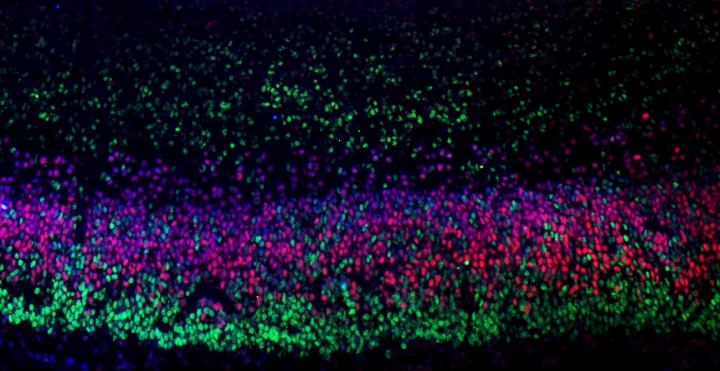A novel approach to immunotherapy design could pave the way for new treatments for people with an aggressive form of brain cancer called glioblastoma.

Credit: Maria Bergamasco, WEHI.
A novel approach to immunotherapy design could pave the way for new treatments for people with an aggressive form of brain cancer called glioblastoma.
Using specifically designed receptors, researchers were able to completely clear brain cancer tumours in preclinical models, using chimeric antigen receptor (CAR) T cell therapy.
Published today in Clinical & Translational Immunology and led by Associate Professor Misty Jenkins, the research is a crucial step towards developing new immunotherapy treatments for this devastating illness.
More than 1800 Australians are diagnosed with brain cancer every year. Brain cancer is the leading cause of cancer death in children and adults under 40. Adults diagnosed with glioblastoma have a five-year survival rate of just five per cent.
At a glance
- Using specifically designed receptors, researchers were able to completely clear brain tumours in preclinical models in the laboratory.
- Chimeric antigen receptor (CAR) T cell therapy works by harnessing the body’s own white blood cells to recognise and destroy their own cancer.
- The research team will now look to progress this research to clinical trials, which would be the first of their kind in Australia for brain cancer.
CAR T cell therapy could offer solution
CAR T cell therapy is a new type of immunotherapy that uses the body’s own T cells to fight infection. It is one of the greatest advancements in cancer therapy in decades and has proven to be effective against blood cancers such as B-cell acute lymphoblastic leukaemia (ALL) and adult diffuse large B-cell lymphoma (DLBCL). There are currently more than 600 CAR T cell therapy clinical trials worldwide.
Associate Professor Jenkins said results from the research were incredibly promising.
“This approach of immunotherapy harnesses the patient’s white blood cells to recognise and destroy their own cancer,” she said.
“Current CAR T cell approaches have relied on repurposing existing antibodies. We have created our own, high-affinity specific receptors, which enable them to bind very tightly to the cells.”
“We found this approach completely cleared the tumour in preclinical models of brain cancer in the laboratory.”
Associate Professor Jenkins said the research team was now looking to progress the ‘proof of concept’ research through to clinical trials.
“If we can progress this to clinical trials, it would be Australia’s first CAR T clinical trial for brain cancer,” she said.
“CAR T cell immunotherapy is still very new, but it has enormous potential, and we are excited about its future applications,” she said.
“This won’t necessarily be the silver bullet for brain cancer, but I envision this treatment could potentially be used in combination with other therapies in the future, offering hope to people diagnosed with this insidious disease.”
Fast-tracking therapeutic development
The research was supported by grants from Carrie’s Beanies 4 Brain Cancer Foundation and the Robert Connor Dawes Foundation. With this support, Associate Professor Jenkins spearheaded a new immunotherapy brain cancer program at WEHI, enabling WEHI to make further advances and breakthroughs for brain cancers in both adults and children. Her research uses a new type of CAR T cell receptor that has superior properties to other versions of the therapy.
“We now have the techniques, tools and platforms established to advance immunotherapies and other brain-cancer-tailored approaches, allowing us to very rapidly test and translate these into the clinic,” she said.
“These therapies could provide hope for many patients, for whom current standard therapies have dismal outcomes.”
In conjunction with this research, the team is also working on developing further enhanced CAR T candidates, which will be the first of their kind, paving the way for novel therapies for patients with solid tumours.
This work, undertaken in collaboration with Myrio Therapeutics, was made possible with funding from Carrie’s Beanies 4 Brain Cancer, the Isabella and Marcus Foundation, the Robert Connor Dawes Foundation, the National Health and Medical Research Council and the Victorian Government.
###
Media Contact
Samantha Robin
[email protected]
Related Journal Article
http://dx.




